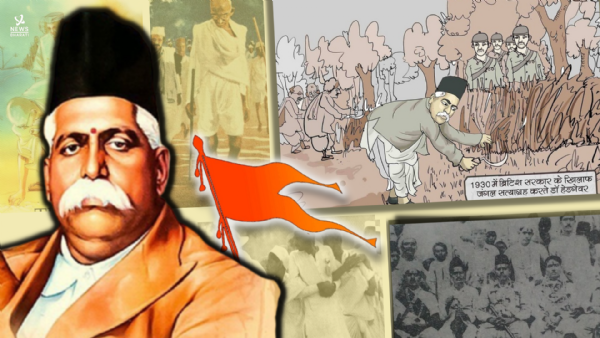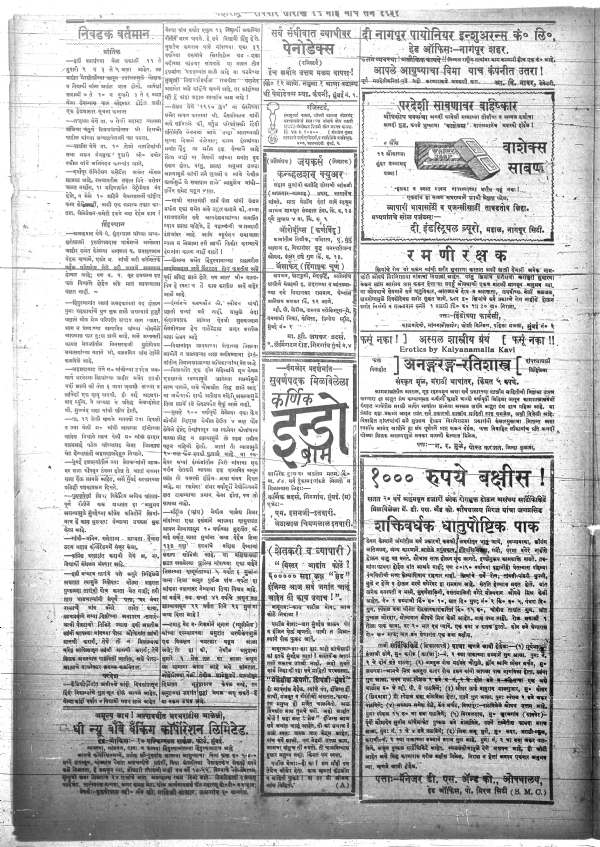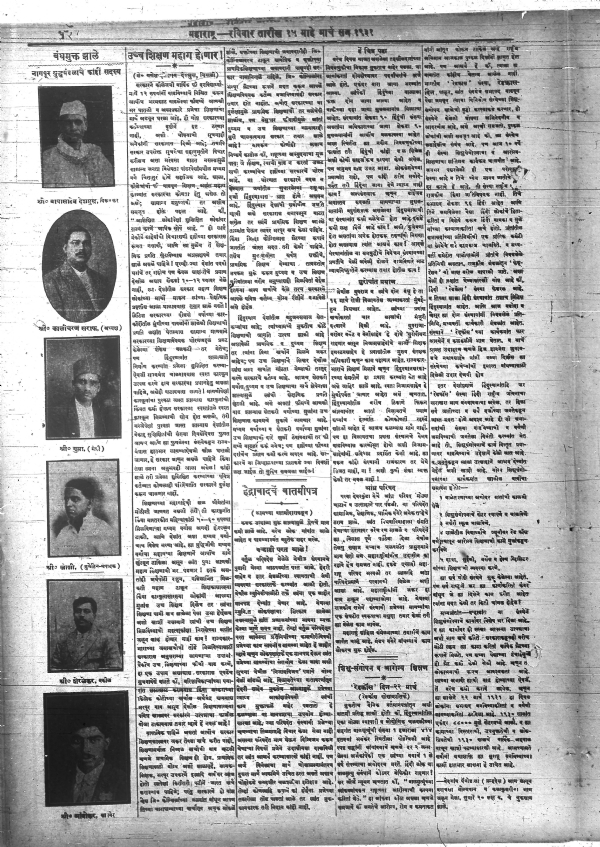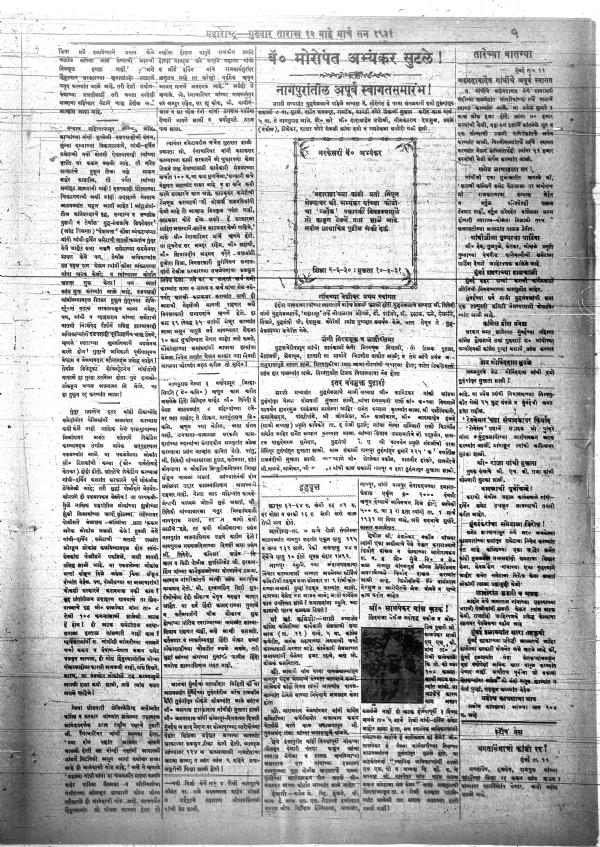RSS and Forest Satyagraha: Relinquishing the post of Sarsanghachalak
14 Aug 2022 00:00:18
The appeal of Gandhi’s Salt Satyagraha lay in its simplicity. By highlighting the tax on a universally used food ingredient, Gandhi aroused the common man throughout the country. Land-locked provinces such as Central Provinces and Berar adopted a program of breaching other repressive laws. Forest Satyagraha in Berar started in Pusad (dist. Yavatmal) on 10 July 1930.
In 1928, an attempt was made to loot the Government treasure chest at Hinganghat railway station near Wardha.As the pistol used in that raid belonged to a revolutionary colleague of the RSS maker Dr.Hedgewar, the latter was now subjected to strict surveillance by the British. It was under these circumstances that Hedgewar and his right-hand colleague Appaji Joshi decided to participate in the Forest Satyagraha. Hedgewar was confident that Sangh swayamsevaks would not wait for his directive to participate in any nationalist agitation. He expected them to do their duty as common Hindus and without any display of organizational identity. It was his cherished conviction that the Sangh ought not to have an identity that was separate from that of the wider Hindu society.

Sangh policy
It seems that Hedgewar had given the liberty to Sangh swayamsevaks to take part in the Civil Disobedience Movement even before this formal statement. In fact, many prominent Sangh swayamsevaks took part in the Movement even before Hedgewar himself decided to do so. The Movement was conducted under the auspices of War Councils that were constituted on an ad hoc basis by the Congress at the Provincial and District levels. Though the Sangh was started in Chanda (present-day Chandrapur) on 20 August 1927, it was Hedgewar’s visit to Chanda in December 1928 that gave fillip to the Chanda Sangh.
The first President of the Chanda War Council Rajeshwar Govind alias Babaji Vekhande went on to be a member of the team of satyagrahis led by Hedgewar (K.K.Chaudhary, ed. Source Material for a History of Freedom Movement, Civil Disobedience Movement, April-September 1930, Vol. XI, Gazetteers Department, Government of Maharashtra, Bombay, 1990, p. 901). Sangh swayamsevaks such as Deshmukh, Annaji Siras, Chendke took the lead in organizing M.S.Aney’s meeting in Chanda on 30 June 1930 (Chaudhary, p. 974).
At a meeting in Nagpur on 1 May 1930, Dr.Moonje prepared contraband salt from saline water brought from Dahihanda (dist. Akola) and read out a passage from V.D.Savarkar’s proscribed book - The Indian War of Independence 1857. He was shortly followed by Sangh Sarkaryavah (General Secretary) Gopal Mukund alias Balaji Huddar who prepared contraband salt and read an extract from the preface of Savarkar’s Life of Mazzini relating to the overthrow of an alien Government (Chaudhary, p.903). At a meeting on 21 May 1930 and attended by around 700 people in Arvi (dist.Wardha), prominent Sangh swayamsevak Dr.Moreshwar Ganesh Apte read out proscribed literature (Chaudhary, p.948). Apte later went on to become Arvi Sanghachalak.
The Sanghachalak of Nagpur district Appasaheb Halde became the twelfth President of the Central Provinces War Council. He was released from jail on 6 March 1931 (Maharashtra, 12 March 1931). Halde was Dictator in Congress and also District Sanghachalak. Some Congressmen complained about this to Gandhi in Halde’s presence when the former had come to Chanda.

Gandhi’s response was, “I know the Sangh, so do not think about Dr.Hedgewar and Halde in this manner.” This reminiscence was narrated by Halde himself to Hedgewar’s biographer Palkar (Sangh archives, Hedgewar papers, Nana Palkar\Hedgewar notes –2 2_133).
Saoner Sanghachalak Narayan Ambokar was released from Raipur jail on 11 March 1931 (Maharashtra, 12 March 1931).

Adv.Shankar alias Annasaheb Dabir of Washim was felicitated after his release from jail on 10 March 1931 (Maharashtra, 15 March 1931). He was appointed Sanghachalak of Washim in August 1931.

Changes in organizational set-up
Before participating in the satyagraha, Hedgewar made some changes in the organizational set-up. In his aforementioned letter to Sangh swayamsevaks dated 20 June 1930, Hedgewar writes,
“Along with Wardha Zilladhikari Appaji Joshi, Parmarth and Deo who are prominent Sangh workers in Nagpur, Vekhande, Kharote and Palewar who are prominent Sangh workers in Chanda as also Arvi Sanghachalak Nanaji Deshpande and Salodfakir Sanghachalak Tryambakrao Deshpande, I am going to participate in the satyagraha that is going on at Pusad in Berar. As a result, the work of the Chalak (lit. driver, chief) of the Ra. Swa. Sangh has been assigned to the famous Dr. Paranjpe of Nagpur and he shall henceforth be the Chalak. Any correspondence with the Nagpur Sangh may be done at the following address (V.V.Kelkar, BA, LLB, Advocate High Court Itwar Darwaja, Nagpur City). Adv. Manoharpant Deshpande, Wardha has been appointed in place of Wardha Zilladhikari Appaji Joshi and correspondence there may be addressed to Deshpande, teacher New English School, Wardha.”
The ever-cautious Hedgewar writes, “While writing above addresses, given addresses only may be written and not the names of posts such as Sanghachalak, Karyavah etc.” He adds, “This year’s Summer Classes were well attended and well arranged. In addition to physical and military classes, intellectual classes too took place.”
What is noteworthy is that nowhere in his letters does Hedgewar betray the slightest nervousness about what might happen to the Sangh in his absence. This speaks volumes about his confidence in his associates and in the methodology of Sangh that he himself had devised.
Renouncing the post of Sarsanghachalak
M. S. Aney who headed the first batch of eleven satyagrahis on 10 July was awarded six months’ simple imprisonment under Section 379 of IPC for cutting grass in an unauthorized manner. Dr. Moonje, who led out the second batch, was sentenced under the same Section to imprisonment till the rising of the Court in default of payment of a fine of Rs. 5. At the invitation of the local satyagraha committee, Moonje repeated the process the following day and was awarded a week’s simple imprisonment in default of payment of a fine of Rs. 10 (Chaudhary, p.980). Hedgewar had planned to ask Moonje to preside over the Sangh’s Guru Puja Utsav and give him a ceremonial send-off. But as Moonje was arrested, he asked Dr. Laxman Vasudeo alias Dadasaheb Paranjpe to preside over the function.
The Guru Puja Utsav of the Sangh was conducted on 12 July 1930 under the Presidentship of Dr. Paranjpe. After the Bhagwa Dhwaj was worshipped, Dr. Paranjpe said,
Having thus made necessary organizational changes in the Sangh and had spelled out his objectives, Hedgewar was now fully prepared to join the satyagraha.
In 1928, an attempt was made to loot the Government treasure chest at Hinganghat railway station near Wardha.As the pistol used in that raid belonged to a revolutionary colleague of the RSS maker Dr.Hedgewar, the latter was now subjected to strict surveillance by the British. It was under these circumstances that Hedgewar and his right-hand colleague Appaji Joshi decided to participate in the Forest Satyagraha. Hedgewar was confident that Sangh swayamsevaks would not wait for his directive to participate in any nationalist agitation. He expected them to do their duty as common Hindus and without any display of organizational identity. It was his cherished conviction that the Sangh ought not to have an identity that was separate from that of the wider Hindu society.

Sangh policy
In a statement addressed to Sangh swayamsevaks on 20 June 1930, Hedgewar says,
“The policy of the Sangh as regards the present agitation is often asked. At present, the Sangh has not decided regarding taking part in the agitation as an organization. Anyone who wishes to take part in his personal capacity may do so after seeking permission from his Sanghachalak. He should work only in a manner that is conducive to Sangh work”
(Sangh archives, Hedgewar papers, Dr. Hedgewar letters cleaned\1930\Jully 1930 20-7-30a).
It seems that Hedgewar had given the liberty to Sangh swayamsevaks to take part in the Civil Disobedience Movement even before this formal statement. In fact, many prominent Sangh swayamsevaks took part in the Movement even before Hedgewar himself decided to do so. The Movement was conducted under the auspices of War Councils that were constituted on an ad hoc basis by the Congress at the Provincial and District levels. Though the Sangh was started in Chanda (present-day Chandrapur) on 20 August 1927, it was Hedgewar’s visit to Chanda in December 1928 that gave fillip to the Chanda Sangh.
The meeting to form the War Council in Chanda was attended by prominent Sangh swayamsevaks such as Abasaheb Chendke, Narayan Pandurang alias Nanasaheb Bhagwat (the present Sarsanghachalak Mohan Bhagwat is his grandson), Raghunath Sitaram alias Dadasaheb Devaikar (Chanda Sanghachalak) and Ramchandra Rajeshwar alias Tatyaji Deshmukh (Chanda Sangh Secretary).
Also Read: RSS and Freedom Struggle: Salt and Forest Satyagraha
The first President of the Chanda War Council Rajeshwar Govind alias Babaji Vekhande went on to be a member of the team of satyagrahis led by Hedgewar (K.K.Chaudhary, ed. Source Material for a History of Freedom Movement, Civil Disobedience Movement, April-September 1930, Vol. XI, Gazetteers Department, Government of Maharashtra, Bombay, 1990, p. 901). Sangh swayamsevaks such as Deshmukh, Annaji Siras, Chendke took the lead in organizing M.S.Aney’s meeting in Chanda on 30 June 1930 (Chaudhary, p. 974).
At a meeting in Nagpur on 1 May 1930, Dr.Moonje prepared contraband salt from saline water brought from Dahihanda (dist. Akola) and read out a passage from V.D.Savarkar’s proscribed book - The Indian War of Independence 1857. He was shortly followed by Sangh Sarkaryavah (General Secretary) Gopal Mukund alias Balaji Huddar who prepared contraband salt and read an extract from the preface of Savarkar’s Life of Mazzini relating to the overthrow of an alien Government (Chaudhary, p.903). At a meeting on 21 May 1930 and attended by around 700 people in Arvi (dist.Wardha), prominent Sangh swayamsevak Dr.Moreshwar Ganesh Apte read out proscribed literature (Chaudhary, p.948). Apte later went on to become Arvi Sanghachalak.
The Sanghachalak of Nagpur district Appasaheb Halde became the twelfth President of the Central Provinces War Council. He was released from jail on 6 March 1931 (Maharashtra, 12 March 1931). Halde was Dictator in Congress and also District Sanghachalak. Some Congressmen complained about this to Gandhi in Halde’s presence when the former had come to Chanda.

Gandhi’s response was, “I know the Sangh, so do not think about Dr.Hedgewar and Halde in this manner.” This reminiscence was narrated by Halde himself to Hedgewar’s biographer Palkar (Sangh archives, Hedgewar papers, Nana Palkar\Hedgewar notes –2 2_133).
Saoner Sanghachalak Narayan Ambokar was released from Raipur jail on 11 March 1931 (Maharashtra, 12 March 1931).

Adv.Shankar alias Annasaheb Dabir of Washim was felicitated after his release from jail on 10 March 1931 (Maharashtra, 15 March 1931). He was appointed Sanghachalak of Washim in August 1931.

Changes in organizational set-up
Before participating in the satyagraha, Hedgewar made some changes in the organizational set-up. In his aforementioned letter to Sangh swayamsevaks dated 20 June 1930, Hedgewar writes,
“Along with Wardha Zilladhikari Appaji Joshi, Parmarth and Deo who are prominent Sangh workers in Nagpur, Vekhande, Kharote and Palewar who are prominent Sangh workers in Chanda as also Arvi Sanghachalak Nanaji Deshpande and Salodfakir Sanghachalak Tryambakrao Deshpande, I am going to participate in the satyagraha that is going on at Pusad in Berar. As a result, the work of the Chalak (lit. driver, chief) of the Ra. Swa. Sangh has been assigned to the famous Dr. Paranjpe of Nagpur and he shall henceforth be the Chalak. Any correspondence with the Nagpur Sangh may be done at the following address (V.V.Kelkar, BA, LLB, Advocate High Court Itwar Darwaja, Nagpur City). Adv. Manoharpant Deshpande, Wardha has been appointed in place of Wardha Zilladhikari Appaji Joshi and correspondence there may be addressed to Deshpande, teacher New English School, Wardha.”
The ever-cautious Hedgewar writes, “While writing above addresses, given addresses only may be written and not the names of posts such as Sanghachalak, Karyavah etc.” He adds, “This year’s Summer Classes were well attended and well arranged. In addition to physical and military classes, intellectual classes too took place.”
What is noteworthy is that nowhere in his letters does Hedgewar betray the slightest nervousness about what might happen to the Sangh in his absence. This speaks volumes about his confidence in his associates and in the methodology of Sangh that he himself had devised.
Renouncing the post of Sarsanghachalak
M. S. Aney who headed the first batch of eleven satyagrahis on 10 July was awarded six months’ simple imprisonment under Section 379 of IPC for cutting grass in an unauthorized manner. Dr. Moonje, who led out the second batch, was sentenced under the same Section to imprisonment till the rising of the Court in default of payment of a fine of Rs. 5. At the invitation of the local satyagraha committee, Moonje repeated the process the following day and was awarded a week’s simple imprisonment in default of payment of a fine of Rs. 10 (Chaudhary, p.980). Hedgewar had planned to ask Moonje to preside over the Sangh’s Guru Puja Utsav and give him a ceremonial send-off. But as Moonje was arrested, he asked Dr. Laxman Vasudeo alias Dadasaheb Paranjpe to preside over the function.
The Guru Puja Utsav of the Sangh was conducted on 12 July 1930 under the Presidentship of Dr. Paranjpe. After the Bhagwa Dhwaj was worshipped, Dr. Paranjpe said,
“Dr.Hedgewar is going for the Forest Satyagraha with some associates. Those who want to take part in that may do so. Others may contribute to the work of this young organization. There is no doubt that the present agitation will take the nation forward but this is only the first step toward the path to freedom. True work lies in organizing those who spend their entire lives for the nation’s freedom.”
Hedgewar who spoke after him declared,
“After I sit down expressing my thanks, I shall cease to be the Chalak of the Sangh. Dr. Paranjpe has agreed to shoulder the responsibility of the Sangh and I heartily thank him on behalf of the Sangh for having done so. Those of us who are participating in this movement are doing so in our individual capacity. There is neither any change whatsoever in the views and method of functioning of the Sangh nor has our faith in the same dim. It is the duty of any organization striving for the country’s freedom to gain knowledge from within and without, of the countless agitations taking place in the country and to utilize them for our work. Those in the Sangh who have entered this present struggle and we who are entering today are doing so with this very objective. Going to jail is today considered as a sign of patriotism. If a person, who is willing to go to jail for two years, is asked to take leave of his wife, children, home and work and do work for an organization wedded to freedom, no one is ready. Why should this happen? This is because people are not willing to understand that freedom for the country can be obtained not by doing work for six months or a year but rather only by continuously doing organizational work year after year. The country will not see better days unless we discard this seasonal patriotism and resolve to be ready to die for the country, but to live even as we continue to strive for organization for the sake of the country’s freedom. The objective of this Sangh is to generate this mindset in the youth and to organize them” (Sangh archives, Hedgewar papers, Nana Palkar\Hedgewar notes –3 3_131, 132).
Having thus made necessary organizational changes in the Sangh and had spelled out his objectives, Hedgewar was now fully prepared to join the satyagraha.
